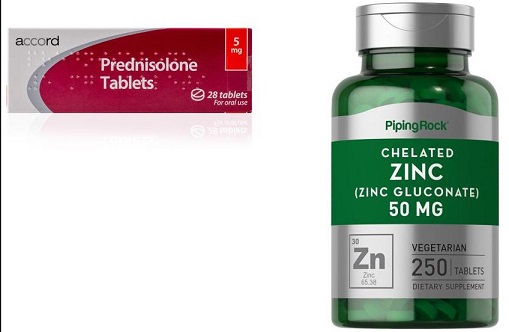Nikhil Prasad Fact checked by:Thailand Medical News Team Nov 30, 2024 4 months, 1 week, 5 days, 22 hours, 13 minutes ago
Medical News: Researchers from the National Yang Ming Chiao Tung University, Taichung Veterans General Hospital, Chung Shan Medical University, and Tungs’ Taichung MetroHarbor Hospital in Taiwan have uncovered promising findings on the treatment of smell and taste dysfunctions in long COVID patients using oral zinc and steroids. This
Medical News report delves into their study, examining how these treatments impact recovery for individuals experiencing long-term sensory loss after a COVID-19 infection.
 Zinc and Steroids Show Potential for Treating Long COVID Smell and Taste Loss
Long COVID and Sensory Impairments
Zinc and Steroids Show Potential for Treating Long COVID Smell and Taste Loss
Long COVID and Sensory Impairments
Long COVID refers to persistent symptoms that continue for weeks or months after the acute phase of a COVID-19 infection. Among these symptoms, hyposmia (reduced smell) and hypogeusia (reduced taste) are particularly troubling for many patients, significantly affecting their quality of life. While most COVID-19-related smell and taste impairments resolve within weeks, a notable percentage of individuals report ongoing issues lasting months or even years.
The study focused on 71 long COVID patients in Taiwan who experienced these sensory impairments during the Omicron variant outbreak. Participants were evaluated using two standardized tests: the University of Pennsylvania Smell Identification Test (UPSIT-TC) for olfactory function and the Waterless Empirical Taste Test (WETT) for gustatory function.
How the Study Was Conducted
The patients in the study received a combination of oral zinc gluconate and prednisolone (a type of steroid) for one to three months. Researchers assessed the changes in sensory function at multiple intervals: initially during outpatient visits, after 2-4 months of treatment, and at follow-ups conducted by phone approximately 10 months later.
At the first visit, 88.2% of patients who complained of smell and taste loss were classified as hyposmic, and 23.5% were identified as hypogeusic.
After treatment, the percentage of hyposmic patients decreased to 77.8%, and those classified as hypogeusic dropped to 16.7%.
Over the 10-month follow-up, 91.2% of the patients reported improvement in their sense of smell, while 88.2% experienced better taste function.
Key Findings From the Study
The study revealed several important outcomes regarding the recovery trajectory for long COVID patients:
-Smell Recovery: Among those with both smell and taste impairments, 64.7% showed improvement in their sense of smell based on objective testing after treatment. By the 10-month mark, 91.2% of participants reported partial or complete recovery.
-Taste Recovery: Taste function improvements were less dramatic but still notable. While 16.7% remained hypogeusic after treatment, the majority saw significant recovery during the follow-up period.
-Patients With Only
Smell Loss: A separate group of 36 patients complained solely of smell loss. Before treatment, 75% were classified as hyposmic. Following treatment, 71.4% remained hyposmic, though 61.1% showed measurable improvement. By the 10-month follow-up, 77.8% reported improvements.
-Variability in Recovery: While many patients experienced significant recovery, some reported persistent dysfunctions even after months of treatment, underscoring the variability in response to therapy.
Why Zinc and Steroids?
The therapeutic use of zinc and steroids is based on their roles in mitigating inflammation and supporting cellular repair. Zinc, a vital mineral, has been shown to aid in tissue recovery and immune response, while steroids like prednisolone can reduce inflammation, which is thought to play a role in sensory dysfunction.
Study Limitations
Although the results are promising, the study acknowledged certain limitations:
The absence of a control group to compare untreated patients.
A high dropout rate for follow-up testing, which may have introduced bias.
The study’s focus on Omicron-infected patients, meaning results may not be generalizable to other variants.
Conclusion
This research highlights the potential of zinc and steroids in treating long COVID-related smell and taste dysfunctions. While most participants experienced significant improvements, some continued to face challenges, emphasizing the need for personalized and ongoing care.
These findings have broader implications for understanding long COVID and improving treatment options. As long COVID continues to affect millions worldwide, targeted therapies like the ones explored in this study may offer hope for better recovery outcomes.
The study findings were published in the peer-reviewed journal: SAGE Open Medicine.
https://journals.sagepub.com/doi/full/10.1177/20503121241301894
For the latest Long COVID News, keep on logging to Thailand
Medical News.
Read Also:
https://www.thailandmedical.news/news/intranasal-chlorpheniramine-as-a-potential-solution-for-long-covid-symptoms
https://www.thailandmedical.news/news/american-study-shows-that-low-dose-naltrexone-is-a-promising-treatment-for-post-acute-sequelae-of-covid-19
https://www.thailandmedical.news/news/south-korean-herbal-medicines-show-promise-in-relieving-long-covid-fatigue-and-cognitive-dysfunction
https://www.thailandmedical.news/news/norwegian-study-finds-that-salmon-oil-shows-promise-in-boosting-immune-health-after-covid-19
https://www.thailandmedical.news/news/medicinal-plants-for-the-management-of-post-covid-19-fatigue
https://www.thailandmedical.news/articles/long-covid
